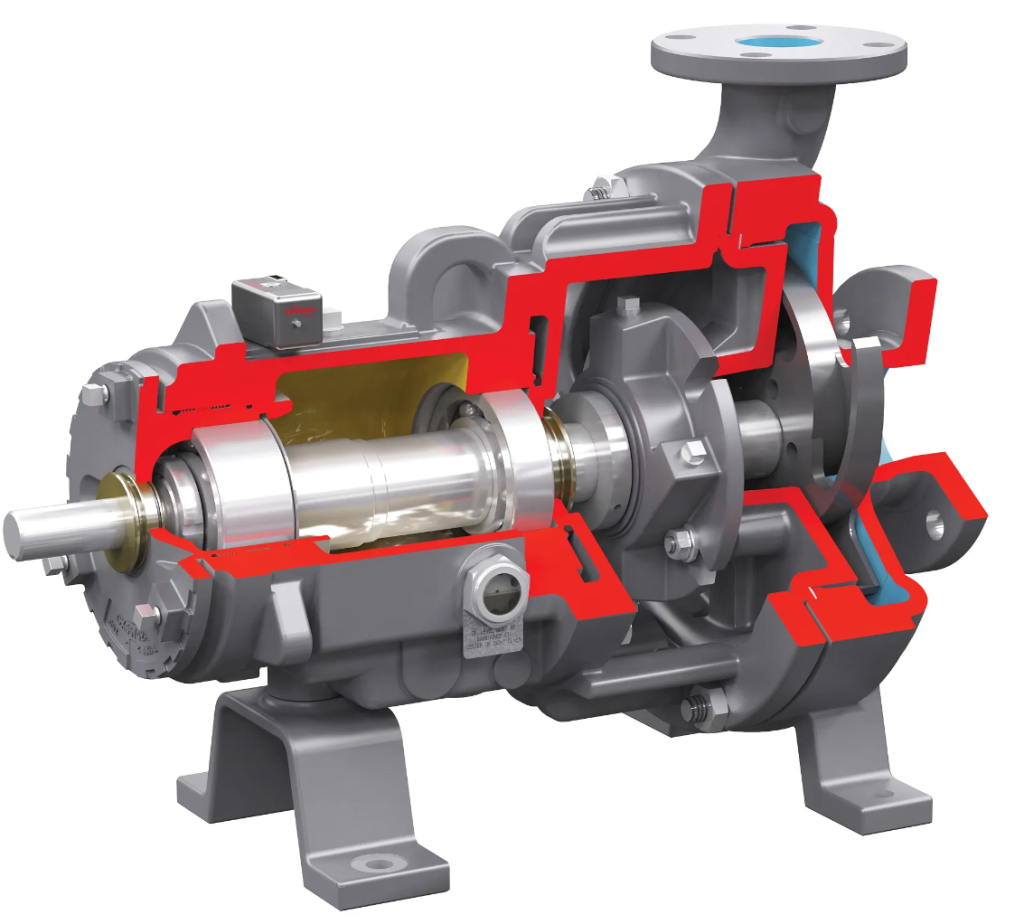
What is a centrifugal pump?
2023-09-07 | Pump
Centrifugal Pump is a type of power mechanical device that creates centrifugal force through the rotation of an impeller (also known as a centrifuge or impeller wheel). This force is used to draw liquid into the pump and then discharge it under pressure, enabling the transportation or pumping action of the liquid.

Ⅰ. Centrifugal Pump Components:
1. Impeller: The impeller is the core component of a centrifugal pump, typically located in the center of the pump. It consists of multiple blades that generate centrifugal force when they rotate. The design and size of the impeller can vary depending on the pump's purpose and performance requirements.
2. Inlet and Outlet: Liquid is drawn into the pump through the inlet and is then pushed to the outlet by the rotating impeller, ultimately being discharged to the desired location.
3. Casing: The casing is the outer shell of the pump, used to secure and support the impeller. It also includes inlet and outlet pipelines to guide the flow of liquid.
4. Seals: Centrifugal pumps typically require a sealing system to prevent liquid leakage or the entry of gases into the pump's interior.
Ⅱ. Working Principle of Centrifugal Pump:
The working principle of a centrifugal pump is based on the centrifugal force generated by the rotating impeller. When the pump is activated, an electric motor or other power source rotates the impeller.
Here is a detailed description of the working process:
1. Liquid enters the pump through the inlet, typically at the center of the impeller.
2. The rotation of the impeller generates centrifugal force, pushing the liquid outward. This results in an increase in the flow velocity of the liquid and an increase in pressure.
3. As the liquid is pushed towards the outlet, it leaves the pump casing and flows to the desired location, such as a pipeline system, storage tank, or other equipment.
Due to the action of centrifugal force, the liquid continuously circulates within the pump, thereby achieving the transport and flow of the liquid.
Ⅲ. Advantages of Centrifugal Pumps:
1. High Efficiency: Centrifugal pumps typically exhibit high efficiency, effectively converting energy into fluid motion energy, thereby reducing energy consumption and operational costs.
2. Versatile Application: Centrifugal pumps are suitable for various liquids, including water, oil, chemicals, sewage, and more, making them widely used across different industrial and application areas.
3. High Flow Rate and Pressure: They can handle large volumes of liquid while generating sufficient pressure to pump fluids from one location to another, making them highly useful in many industrial processes.
4. High Reliability: Centrifugal pumps are usually designed with simplicity, fewer mechanical parts, and ease of maintenance. This results in high reliability, allowing them to operate for extended periods without frequent maintenance.
Ⅳ. Performance and Efficiency Indicators for Centrifugal Pumps:
1. Flow Rate (Q): Flow rate is the volume of liquid pumped by the pump per second and is typically expressed in cubic meters per second (m³/s) or gallons per minute (GPM).
2. Head (H): Head is the pressure or height to which the pump can lift or raise the liquid and is typically measured in meters (m) or feet (ft).
3. Power (P): Power is the energy required by the pump to move the liquid and is usually measured in watts (W) or horsepower (HP).
4. Efficiency (η): Efficiency refers to the proportion of power converted by the pump to the power provided. It is typically expressed as a percentage. High-efficiency pumps can convert energy into fluid motion energy more effectively.
5. NPSH (Net Positive Suction Head): NPSH is the minimum pressure required at the pump's inlet to prevent liquid vaporization and bubble formation. A low NPSH value may lead to performance degradation and pump failure.
6. Operating Characteristics: The operating characteristics of a pump include its performance curve, which shows the head and efficiency at different flow conditions. These curves help in selecting the most suitable pump.
Centrifugal pumps offer advantages such as high efficiency, a wide range of applications, and high reliability. Their performance and efficiency can be assessed through indicators like flow rate, head, power, efficiency, NPSH, and operating characteristics.
Ⅴ. Applications and Functions:
1. Water Supply and Drainage Systems: Centrifugal pumps are used in urban water supply systems to pump water from sources such as rivers, lakes, or underground water into supply pipelines for residential, commercial, and industrial purposes. They are also used in drainage systems to discharge wastewater or rainwater to sewage treatment plants or drainage channels.
2. Industrial Applications: Centrifugal pumps find wide-ranging applications in various industries including the chemical industry, petroleum and natural gas industry, mining, food and beverage production, and more. They are used to transport chemicals, crude oil, slurry, food ingredients, and more.
3. HVAC Systems: Centrifugal pumps are used in heating, ventilation, and air conditioning (HVAC) systems of buildings to circulate coolant (such as water or refrigerant) for temperature control, cooling, or heating the interior spaces.
4. Fire Protection: Fire pumps in fire protection systems use centrifugal pumps to provide sufficient water flow and pressure for firefighting or fire suppression.
5. Chemical Processing: In the chemical industry, centrifugal pumps are used to transfer chemicals from one vessel to another for mixing, processing, and handling.
6. Agriculture: In agriculture, centrifugal pumps are used for irrigating crops, providing drinking water for livestock, treating wastewater, and other agricultural applications.
7. Mining: In the mining industry, centrifugal pumps are used for dewatering mines, transporting slurry, and processing ores.
8. Marine Applications: On ships and offshore platforms, centrifugal pumps are used for handling seawater, supplying fresh water, and controlling the stability of vessels.
Centrifugal pumps play a critical role in multiple fields as they efficiently accomplish tasks such as fluid transport, water supply, drainage, and processing.